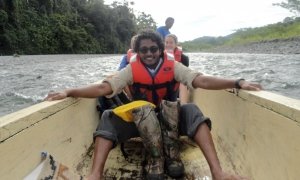The following was written by Ros Thackurdeen and the aim of sharing their story is to help saves lives. Please be aware of the dangers in the water.

Ravi Thackurdeen
Our Son, Ravi Thackurdeen, the love of our lives was 19 years when he drowned on April 29, 2012 full of his future on Duke/OTS Study Abroad Program on Global Health here in Costa Rica. The program sponsored a surprised trip to the beach bringing the students to Playa Tortuga as an end of semester celebratory trip. Ravi wading in hip height water was swept out to sea by a rip tide. Ravi threaded water for over half hour waiting for help. He could no longer hold on and slipped under the waves. Soon after a fishing boat arrived much too late. Tortuga Beach is not advisable for swimming as it is near the mouth where the river enters the ocean; Rio Terraba, Rio Ojochal, Rio Tortuga and Rio Balso causing dangerous undertows and turbulence. Only if the students knew…it would mean I’d have my son here with me today. Awareness is key!

Ravi Thackurdeen
Ravi had a strong interest in public health and ethno botany. Ravi and two teammates studied the relationship between cooking practices and upper respiratory infections in the Ngobe community. It was found that time spent cooking was the most important predictor of upper respiratory infections, followed by low ventilation in the kitchen with women and children most exposed and at higher risk for respiratory infections. Several ways to lower smoke exposure are by introducing more efficient stoves and increasing health education on the dangers of cooking smoke. One unique way is to encourage the use of good wood, which can lower both the cooking time and smoke emissions. Ravi along with teammates conducted surveys in the Ngobe Territory studied, researched and tested the types of wood used for cooking. Research, thesis and flyer in Spanish presented on April 27th, on the use of wood-burning stoves. The Spanish brochure was translated to the Ngobere language by Dr. Ortiz with a grant from UNICEF. The brochures was distributed to the Ngobe community by Ravi’s family and OET. Medical supplies, ivy poles, medications, gloves, backpacks, diabetic supplies was donated in Ravi’s honor to the Ngobe Clinic and Dr. Ortiz, distributed into the indigenous communities. Additionally, Ravi collected eight plant specimens that is part of the digital archives at Las Cruces Herbarium where scientist/researchers worldwide will be able to access for research…he is now Collector Ravi.
This most important research calls attention to the public health problem of cooking smoke leading to changes in the cooking practices of the Ngobe community. Additionally, Ravi collected eight plant specimens that became part of the digital archives at Las Cruces. He was a skillful EMT, tutored high school students in math and science and taught chemistry courses in his department.
Ravi’s high school superintendent said, “Ravi had the potential to do great things in his lifetime. Not only is his sudden taking from life impacting this town, but it impacts the entire world. Ravi was destined to make a difference in the world.”
Our family would like express our sincerest gratitude to Mr. & Ms. Dan Christoph and Mr. Brian Simmons who risked their lives trying to help our son.
Rip currents (commonly known as rip tides or undertows) are one of the most dangerous and ubiquitous members of Costa Rica’s beach communities and cause more tourist deaths in Costa Rica than all other reasons put together. As a result of misinformation, sudden weather changes, and sudden wave swells several tourists, even the strongest of swimmers succumb to Neptune’s quiet hidden killers each year. 90% of Costa Rica’s 150 to 250 total drowning deaths each year occur at 5% of Costa Rica’s beaches, and 80% of those deaths are rip tide assisted.
Locals understand and heed the risks while many visitors do not because of lack of information, lack of lifeguards at many of the most popular swimming spots and lack of signs. Ocean currents on both the Caribbean and Pacific Coasts are swift and dangerous and can quickly sweep even the best swimmers out to sea. Seek reliable advice, swim only at beaches where a lifeguard is present and use extreme caution. Be aware emergency response time is not what you might be used to. Crucial minutes which can mean the difference between life and death. Visitors should carefully consider the safety of any beach before entering the water.
Read more about What to Do in Case of Rip Tides >
Read more about Costa Ballena Lifeguards >>>




